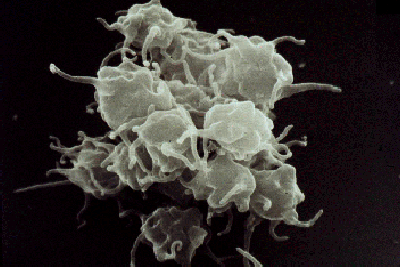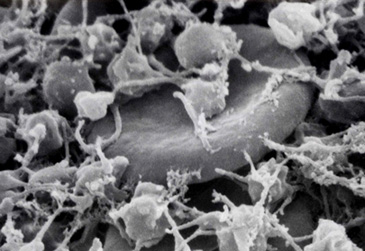Liz’s Story
Severe TTP with Multiple Complications but Complete Recovery
January 2007
On the morning of February 8, 2005, Liz, a 63-year-old woman, began experiencing stomach pains. She said that it felt like indigestion, and because she’d had problems with stomach acid, she didn’t think much of it since the stomach pains didn’t get too bad. The next day she awoke at 10 to get ready for her afternoon shift at work. She states that when she got up, she knew "something wasn’t right." The pain in her stomach had gotten worse, and by 12:30 she still wasn’t feeling any better. Liz’s mother was at her house at this time and noticed that something was wrong with her, too. She said that Liz was bleeding from her mouth, her skin appeared yellow, and she was walking into walls and furniture. Liz remembers feeling dizzy, having a headache, and feeling confused, but she doesn’t recall getting dressed and ready for work that morning and she didn’t go to work.
By 5 that afternoon, Liz and her mother realized that something was really wrong, so they went to the emergency room. "I remember leaving my house, going to the hospital, and signing in at the registration desk, but I don’t remember much after that," she says.
Upon arrival to the hospital in her hometown, Liz’s doctors found that her platelet count was only 10,000 (normal range is 150,000-450,000) and her kidney function was abnormal. She was given a platelet transfusion in the emergency room and admitted to the hospital. Steroids were also started at this time. The next day she was seen by a hematologist who made the diagnosis of TTP (thrombotic thrombocytopenic purpura). By this time, Liz’s hematocrit (this is a measure of the percentage of red blood cells in the blood) had fallen to 30% (the normal hematocrit is 36%-44%), and she required four units of blood in addition to another unit of platelets. At this time, the hematologist caring for Liz decided to transfer her to another hospital so that her illness could be managed in a more intensive setting. "One of my only memories from the day in this first hospital was the doctor telling me that I was going to be transferred to a hospital in Oklahoma City," she says. Liz arrived at the new hospital early in the morning on Saturday, February 11.
Upon arriving at the new hospital, Liz was immediately admitted to the intensive care unit (ICU) and plasma exchange was begun. Plasma exchange therapy is a standard treatment for adults with TTP. This treatment utilizes a machine that removes a patient’s plasma from their blood and replaces it with fresh plasma from multiple normal donors. Both the removal of something potentially harmful and replacement of something helpful appear to be important for the effectiveness of plasma exchange treatment. Daily plasma exchange was continued for the next two days, and steroids were started again on February 13. Liz was feeling better until early in the morning on the 13th, when she started to have a headache. Other than the headache and her continued low platelet count of 6,000, she seemed to be doing okay. Her kidney function was improving. However at midmorning, she became confused and during a conversation she was unable to find the right words to say (the medical term for this is "expressive aphasia"). She couldn’t name a ring or a watch, although she knew the right word when the doctor said it, and she knew the day but could not say it. She knew where she was, but she could not say the name of the hospital. "I don’t remember any of this, but my family has told me about it since I’ve been out of the hospital," Liz says. A CT scan of her head was done, and it was normal with no signs of bleeding or blood clots in her brain; there was no stroke. Therefore, her steroid dose was increased and plasma exchange was done twice daily for the next two days instead of just once per day. On Valentine’s Day, Liz’s mother and two daughters visited her in the hospital. However, the only person she recognized at the time was one of her daughters. She didn’t know who her mother and other daughter were. This was very difficult for her family. Thankfully, Liz’s speech returned to normal on February 15. Her platelet count also increased for the first time since her hospitalization, to 60,000.
The following day (February 16), Liz’s platelets had decreased again to 40,000. However, it was decided to treat her with only one plasma exchange that day followed by an infusion of a drug called rituximab. Rituximab is a drug that is approved for the treatment of particular types of lymphoma (a cancer of the lymphatic system), however it has been shown to be effective in the treatment of other disorders such as TTP. Later that morning, Diana became aphasic (unable to find the right words) again and then she became totally unresponsive. Her blood pressure fell rapidly, and her platelet count had fallen even further to 18,000. Liz was given an intravenous (IV) drip of medicine called dopamine to raise her blood pressure. She received two plasma exchanges in addition to the infusion of rituximab that day. The next day her platelet count remained low at 17,000, but her blood pressure was normal. She was awake and alert this morning, but then became confused and had difficulty with her speech again.
On February 18, Liz’s platelets had decreased even further to 10,000. Although her eyes were open and she seemed awake and alert, Liz was not responsive and she had purposeless movements of her right arm. She continued to worsen throughout the day. The next day her platelet count decreased even further to 7,000. Later that day she had a fever of 102.7 degrees, and her doctors suspected that Liz had sepsis. (Sepsis is a potentially life-threatening bloodstream infection caused by toxin-producing bacteria.) Therefore, she was promptly started on antibiotics. However, she had four grand mal seizures (a type of seizure in which a person loses consciousness and has rhythmic convulsions or jerking movements of their entire body) later that day and her blood pressure became very low. Her deteriorating condition required her to be transferred back to the ICU where she had to have a tube placed down her throat (the medical term for this is "intubation") so that a machine (a ventilator) could breathe for her. As a last effort to raise her platelet count, she was given more steroids and additional IV medicines, vincristine and cyclophosphamide (chemotherapy drugs that are sometimes helpful in the treatment of TTP.) At this time, her doctors thought she would die from her TTP. The next day, she remained unresponsive and still required the ventilator to breathe for her, but her platelet count had increased to 15,000. The doctors had some hope again.
Finally, on February 21, Liz improved remarkably. Her blood pressure was now stable, and her platelet count increased to 48,000. Her kidney function was slowly improving again. She was awake and able to be taken off the ventilator. Her red blood cell count was low however and she required a red blood cell transfusion. During all of this time she was still undergoing twice-daily plasma exchange, which continued through February 23. At this point, her platelet count was 101,000. On February 24, she received just one plasma exchange in addition to her second infusion of rituximab, and her platelet count increased further to 227,000. She was finally able to have the tube removed from her throat on February 27. Now the doctors were confident of her recovery. Liz seemed to be doing quite well, although she was still extremely weak from all that she had been through. She could talk comfortably, but she had no memory of the past week.
However the very next day, February 28, Liz’s platelet count fell sharply again to 119,000, and twice daily plasma exchange was started again for six more days. During this time her platelet count continued to fall to 84,000, but it finally recovered to normal again, 197,000. She also received another treatment of vincristine and a third infusion of rituximab. Fortunately, Liz did not experience any more seizures or trouble finding words during this time when her TTP got worse again.
On March 6, Liz resumed once daily plasma exchange when her platelet count reached 247,000. She continued to receive plasma exchange daily through March 10 when her fourth rituximab infusion was given. This was planned to be her last day of plasma exchange treatment. She had received 44 plasma exchange treatments since beginning on February 11th! On her second day of no plasma exchange she maintained a normal platelet count, although it had dropped from 313,000 on March 8 to 222,000 on March 12. Her speech and personality were back to normal, and she was beginning to understand everything that had happened over the last month. She had no memory of her speech trouble on February 13-14, and no memory of the critical complications that occurred on February 16.
Over the next month, Liz remained hospitalized and continued to receive plasma exchange therapy either twice or once daily. There were two instances during this time when she had improved enough that her doctors were planning for her to go home. "Unfortunately, each time my doctors were planning to discharge me from the hospital, my platelet count would drop, and I would need more plasma exchange treatments," she says. Finally, on April 12th, Liz went home after spending two months in the hospital and receiving 79 plasma exchange treatments. Liz was certainly ready to go home, and her family was thrilled that she had recovered after everything that she had endured. When Liz went home, her platelet count was normal (210,000) and she was gradually tapered off plasma exchange over a two-week period, receiving a total of six more plasma exchange treatments.
When asked about her experience with plasma exchange, Liz states that she didn’t have a problem with it at all. "I even named the plasma exchange machine ‘Big Bertha.’" During the 2 to 3 hours that each plasma exchange treatment required, she played games and talked with the nurses. Her positive outlook certainly helped her get through all of the treatments she received.
Liz states that she had some short-term memory loss after she was discharged which lasted about 2-3 weeks. She could remember everything from before she got sick, but she would have trouble remembering things that happened a few minutes before. She doesn’t think she has any memory or concentration problems now, but her family members think she has trouble remembering conversations sometimes. Liz continued to take steroids until May 15. About one week after taking her last steroid pill, she started having discomfort in the front part of her thighs. This discomfort progressed to sharp pains and weakness in her legs. "I was having trouble walking and climbing stairs and I had to use a walker for awhile," she says. Her doctor diagnosed her with steroid-induced muscle weakness, which is a common problem with prolonged steroid use. After undergoing six weeks of physical therapy, three times per week, Liz recovered her muscle strength. She was able to return to her job at Wal-Mart in September, seven months after she became sick.
Because Liz was in and out of consciousness during the first part of her illness, she doesn’t remember much of the time she spent in the ICU. "The hardest part of my entire experience with TTP has been hearing about what I went through from my family and friends." In fact, she learned that her family had made funeral arrangements twice because she was so gravely ill and her doctors didn’t think she was going to be able to survive. Her family states that this whole experience was an emotional roller coaster for them because Liz’s situation kept changing so rapidly. When asked what her greatest source of support was throughout her bout with TTP, she says that her family, co-workers, doctors, nurses and hospital staff were all incredibly supportive. Liz says, "I was so impressed by how much my co-workers supported me, and my name was even put on Wal-Mart’s website on the prayer request section."
Liz has learned not to take anything for granted during this ordeal. "You don’t realize how many people care about you and the power of prayer until you face a situation like this," she says. Liz offers this advice for those with TTP: "Keep your spirits up. Try to get as much information as you can about the illness, and have a good outlook." When asked if she thinks she has changed personally since her illness she states, "I don’t think I’ve changed but others have told me that I’ve mellowed out."
"I still think about TTP everyday, and I am still learning about what happened during my illness," Liz says. However, she is in great spirits and is still working full-time. After everything she endured, her mother has given her a nickname that has caught on among her family and friends. Liz is now affectionately known as "The Miracle Lady."
Comments by Dr. George:
Update 2011: Liz continues to do very well. She lives alone with children nearby. She had lived with her mother, but her mother died three years ago. She has retired from her job at Wal-Mart that she had for 11 years. Now she is very contented just staying at home. She sees her doctor for regular medical care. She has high blood pressure that requires medicine; this was present before her episode of TTP. She requires insulin for diabetes; this developed while she was taking high doses of steroids in the hospital for her TTP. Otherwise she is quite healthy. One month ago she required one day in the hospital for a diagnosis of pneumonia but she recovered quickly and now she is back to her usual good health.
This is what we hope for and expect following recovery from TTP. Even with Liz’s extremely critical illness, we expect recovery and hope for no further problems. As described above, I believe that Liz had the most serious and complicated episode of TTP that I have ever seen. She was in the hospital for over two months, required 79 plasma exchange treatments. On 18 days she required twice daily plasma exchange when it seemed that other treatments were not controlling her TTP. These other treatments included high doses of steroids, vincristine, cyclophosphamide, and rituximab. In other words, we did everything that we knew how to do. And the outcome was successful.
I enjoy seeing Liz each year. These have become social visits rather than medical visits. Liz, of course, continues to be aware and alert for any signs of recurrent TTP. She told me this month that she has to change her primary care physician, since her previous physician has changed careers. She tells me that when she meets her new physician next month, she will bring in her file folder of all of her TTP information. I suspect that this will be more information than her new doctor can easily interpret. The most effective way for a smooth transition of primary care doctors will be for me to talk to Liz’s new doctor. What I will tell her doctor is what I tell all patients and their doctors. No special care is needed. Routine care is sufficient. The only special thing is that a blood count, especially a platelet count, is absolutely required at the time of any illness. And I mean any symptoms: nausea, vomiting, diarrhea, fever, cough, severe headache, weakness, bruising……anything could be a sign of recurrent TTP.
[First written January 2007. Last updated October 2011.]
IMPORTANT!
The information included in this website is for educational purposes only. The designers and operators of this site take no responsibility for the things you may do with this information. For advice on your unique medical condition, please consult your health care professional. By going further into this website you acknowledge that you have read and understood this disclaimer.



